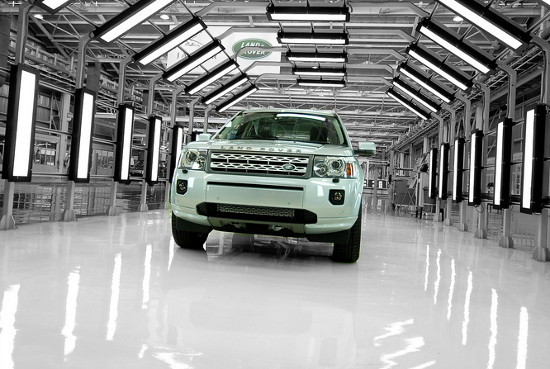The British car manufacturing industry is going from strength to strength in 2012, with popular motoring brands from all over the world pumping cash into commercial property factories around the country. In the past year alone, names such as Vauxhall, BMW and Jaguar Land Rover have all invested into the country, taking such measures as extending manufacturing plants and moving major production of new vehicles solely to the UK to take advantage of the boom in the industry.

This week both Jaguar Land Rover and Honda have increased their interests in British manufacturing, with a combination of investments worth a total of £637 million.
£370 million of this investment sum comes from Jaguar Land Rover, who plan to use the money in the manufacturing of its highly anticipated new Range Rover model. The production will be based at its Solihull commercial property in the West Midlands, which will be upgraded in order to be able to cope with the high pressure production demands from all over the world. Much of the investment will be channelled into the new aluminium body shop required to put together the new Range Rover. Also benefiting from the cash injection will be the hi-tech paint shop, warehousing and trim assembly sectors.
Jaguar Land Rover additionally announced the establishment of its first customer handover centre, which will be based at the Solihull plant.
Chief executive of Jaguar Land Rover, Dr Ralf Speth, said; “This Range Rover symbolises our commitment to investing in Britain and exporting around the world, in a model that enjoys iconic status in almost every market.”
Fortunately, it seems that Jaguar Land Rover’s investments into British business are set to continue, largely thanks to the major success the company has had in the past two years. In this year alone, pre-tax profits rose by one third in the first quarter to £333 million, and in the 3 months ending on the 30th June more than 85,000 cars produced by Jaguar Land Rover had been sold worldwide. This is a tremendous success story in a time where the average person’s disposable income is extremely low and luxury cars are an expense many cannot even dream of.
However, Jaguar Land Rover seems keen to continue to invest their profits, rather than sitting on them as so many companies choose to do in a time of austerity. In the past two years alone, the company have created jobs for more than 5,000 British people, as well as providing the support for suppliers to keep 190,000 jobs in the country. This is partly due to the contracts Jaguar Land Rover have awarded in the past few years, with around £800 million in investments being split amongst 170 UK commercial property businesses.
Bosses at Jaguar Land Rover said the firm was “firing on all cylinders”, and that they were set to expand on Land Rover models and worldwide sales in the near future. Certainly, worldwide sales seem to be an area of strength for the car manufacturing company, with exports to China and Russia having helped boost sales by 20 per cent this year.
However, Jaguar Land Rover are by no means the only motoring company choosing to invest in British business at the moment. This week, Honda also announced a major cash injection into its British manufacturing plant, this time in Swindon. £267 million will be channelled into production at the factory, which has already seen hundreds of new jobs created in order to keep up with customer demand. Honda claims that this investment is the largest in over a decade to be input into the Swindon plant.
With the British manufacturing industry defying all economic predictions and giving a welcome boost to the economy, it can only be a matter of time before other companies who have not yet taken advantage of the boom begin to direct funds into the country’s considerable production strength. However, with the Eurozone still in crisis and the rest of the world by no means economically sound, is this to be simply a short lived respite from the recession?
Do you think foreign investment in the British manufacturing industry is a good thing, or do you believe that British businesses should be the ones benefiting from the country’s resources? Why do you think luxury cars are still so popular despite the number of people struggling to afford essential items such as food and clothing?